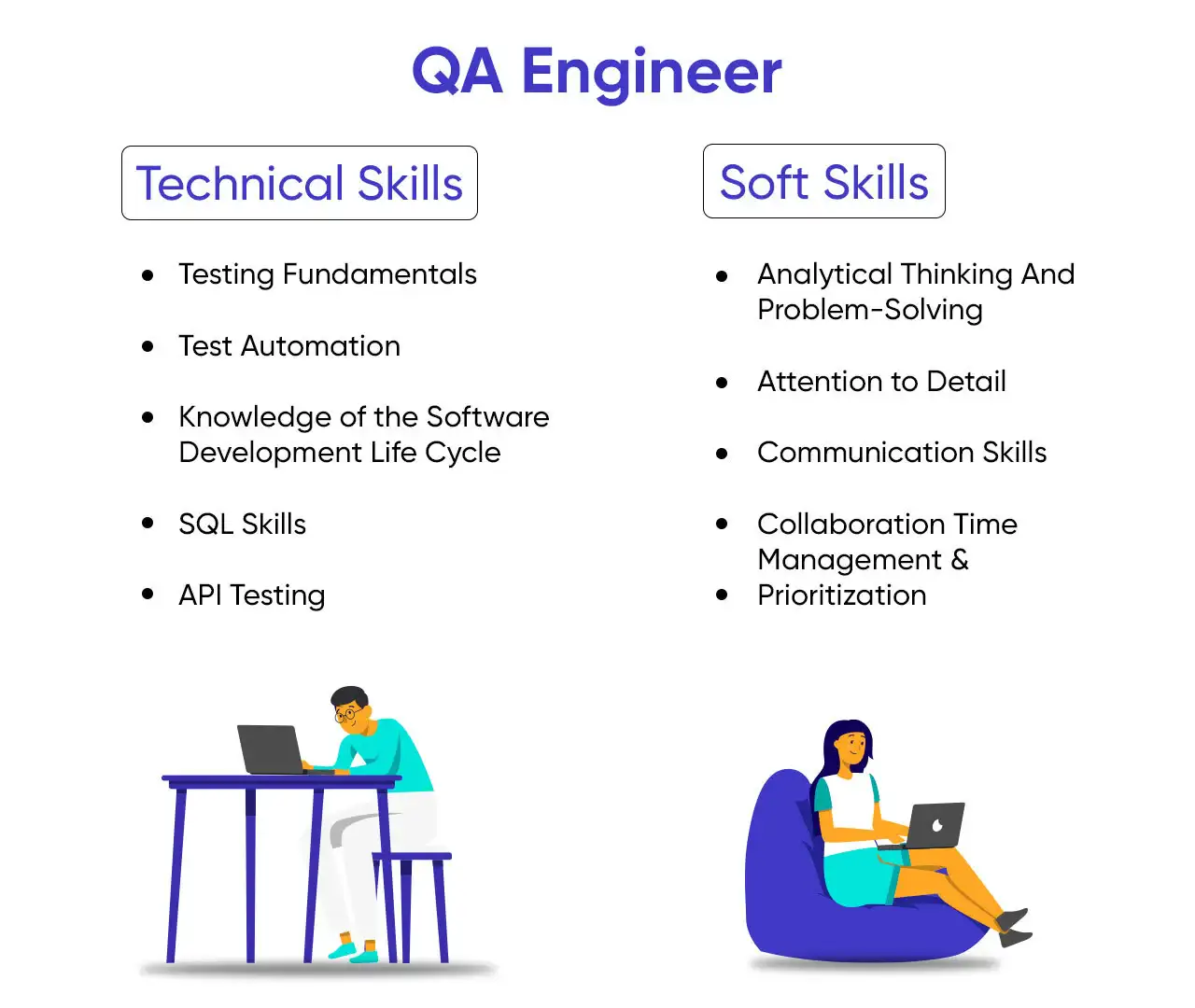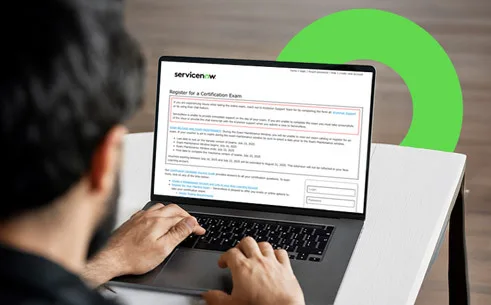Table of Contents
The software development life cycle is incomplete without software quality assurance. Imagine that after working day and night perfecting the codes, your software crashes due to some tiny bug.
This is a nightmare for developers. To avoid this, a quality assurance engineer must test and analyze the software for errors or bugs throughout the SDLC. Working as a helping hand behind the scenes for the development team, QA engineers are responsible for monitoring every phase and using the right problem-solving approach.
In this blog, we will explore the profession of QA engineers, their day-to-day work, and the skills that you will need to become a quality assurance engineer.
So, let’s start with an in-depth understanding of who these QA engineers are.
What is a QA Engineer?
To maintain the quality standards of any application or software, there is a dedicated team of Quality Assurance Engineers. QA Engineers are responsible for various things, from software testing to suggesting developer improvements.
Essentially, they must ensure that the software has no bugs or errors. They perform a series of tests to evaluate the software and determine discrepancies. This can be done either manually or using any automated tests.
The QA team designs these tests per the organization’s quality standards. After analyzing the results of these tests, if any errors are found in the program, the QA team resends the code for improvement and optimization.
Now that you know what a QA Engineer is, let’s look at their day-to-day responsibilities.
Roles and Responsibilities of a QA Engineer
Is testing all that comes under QA roles and responsibilities? Well, it covers a large part of their job description, but it is not all what a QA engineer does. Here is what you will be responsible for as a QA Engineer:
- Establish guidelines and practices that developers must adhere to.
- Run both automated and manual test scripts.
- Write code and put tests in an automated manner.
- Engage in dialogue with stakeholders to comprehend and elucidate the software needs.
- Examine test findings to forecast user behavior, find errors, and provide recommendations for fixes to reduce issues.
- Maintain quality metrics and closely collaborate with the product development and testing teams to guarantee timely project delivery.
- Make sure the finished product satisfies the requirements.
- Examine the product’s features and recommend improvements to make them more effective and user-friendly.
- Keep yourself informed about the most recent industry rules, norms, and advancements.
The QA engineers should have all the necessary skills to perform these tasks efficiently. Read along as we guide you through these QA engineer skills.
Skills Required to Become a QA Engineer
As the profile stands out in the IT industry, it is evident that you must have some technical skills to sustain any organization. While a foundational knowledge of coding is required, it is not mandatory to be a competitive coder.
You can pursue a bachelor’s degree in computer science engineering. However, if you hail from a non-technical background and wish to become a QA engineer, consider taking a short-term QA Training course. Now, let’s look at the skills you must have as a QA Engineer.

Technical Skills
- Testing Fundamentals: A thorough comprehension of the fundamentals of software testing, including test case design techniques, performance, usability, and security testing, as well as non-functional testing.
- Test Automation: To automate repetitive testing operations, being familiar with scripting languages (like Python and Java) and automation tools (like Selenium and Cypress) is helpful.
- Knowledge of the Software Development Life Cycle: QA Engineers can more successfully integrate their testing operations across the process by thoroughly understanding the various stages of software development.
- SQL Skills: For database-driven applications in particular, a basic understanding of SQL might be helpful when accessing data within the software under test.
- API Testing: As more and more modern apps rely on APIs for data interchange, it is crucial to understand how to test APIs (Application Programming Interfaces).
Soft Skills
- Analytical Thinking and Problem-Solving: The capacity to recognize and evaluate difficulties, exercise critical thought, and resolve challenging situations during examinations.
- Attention to Detail: The ability to spot even the most minor mistakes and discrepancies in functioning user interface.
- Communication Skills: Informing developers and other stakeholders of found issues, test findings, and suggestions understandably and efficiently.
- Collaboration: Efficiently coordinating efforts among developers, product managers, and other team members to guarantee that all share quality objectives and testing plans.
- Time management & Prioritization: The capacity to effectively prioritize work, control workload, and adhere to test deadlines.
- Adaptability and Learning Agility: New tools and technology are constantly changing the field of quality assurance. It is essential to be open to learning new techniques and tools for testing and adapting to them.
How to Become a QA Engineer?
Do you possess the skills we mentioned above? Well, then, you should definitely consider becoming a QA Engineer. To help you out, we have curated this step-by-step guide on how you can become a quality assurance engineer.
1. Learn Coding and Software Development
To start, you must know how to write in an object-oriented language, such as Python, C#, or Java, to work as a QA engineer. The language you need to know can vary depending on the industry. So, determine if you will work in web development, software development, or embedded systems.
For a position as a QA engineer, a technical degree in computer science, information systems technology, or software engineering would be an excellent starting point. However, you can also consider participating in boot camps or QA Training courses to fast-track your studies.
2. Internships and Volunteering
Students often neglect internships, a great way to build foundational skills. They add value to your resume and make you a credible candidate for the job market. You can also volunteer for nonprofit organizations as a QA engineer and add these projects to your resume. The best part is that you can start your internship while still studying, saving time.
3. Develop Technical Skills
A Quality Assurance Engineer needs to be updated with the required technical skills. They should be able to test software manually or with automated tools. The best way to develop technical skills is by participating in hands-on projects.
You can find such projects online in communities or on platforms such as GitHub. Real-world cases will allow you to enhance your understanding of quality assurance standards and analysis.
4. Start Your Job Hunt
Once you have acquired all the required skills and are ready to take on a real job, start browsing. Maintain a resume or portfolio of what you have learned and what you have done, which will help you showcase your skills as a QA engineer, and start your interview prep in advance.
Technical interviews can be daunting, so ensure you are up-to-date with quality assurance processes and the latest tech updates. Grab the most suitable opportunity and begin your journey as a Quality Assurance Engineer.
But why should you consider this career path? Well, the benefits and possibilities are endless. Let’s see what the compensation for a QA engineer looks like so that you can make a well-informed decision.
Salary of a QA Engineer
The average base salary of a QA engineer is INR 6 LPA in India. The initial pay can start from INR 3.5, and the highest stipend goes up to INR 12 LPA after a few years of experience. The compensation varies depending on location, skills, knowledge, industry, and organization.

Conclusion
To conclude, a QA Engineer is an essential asset for any organization. They create assessments, test the software throughout the development, and suggest improvements to the development team.
As a quality assurance engineer, they must ensure the product meets the quality standards. From manual testing to handling automation tools, they should be skilled to deliver the best during the quality assurance process.
To begin your career in quality assurance, you should be familiar with the SDLC, testing, automation tools, quality standards, etc. You can gain this knowledge with the help of a QA training course or boot camp.
We hope this guide was helpful to you; good luck on your testing journey!
Join our newsletter: Get daily update on Salesforce career insights & news!
Join Now!
















